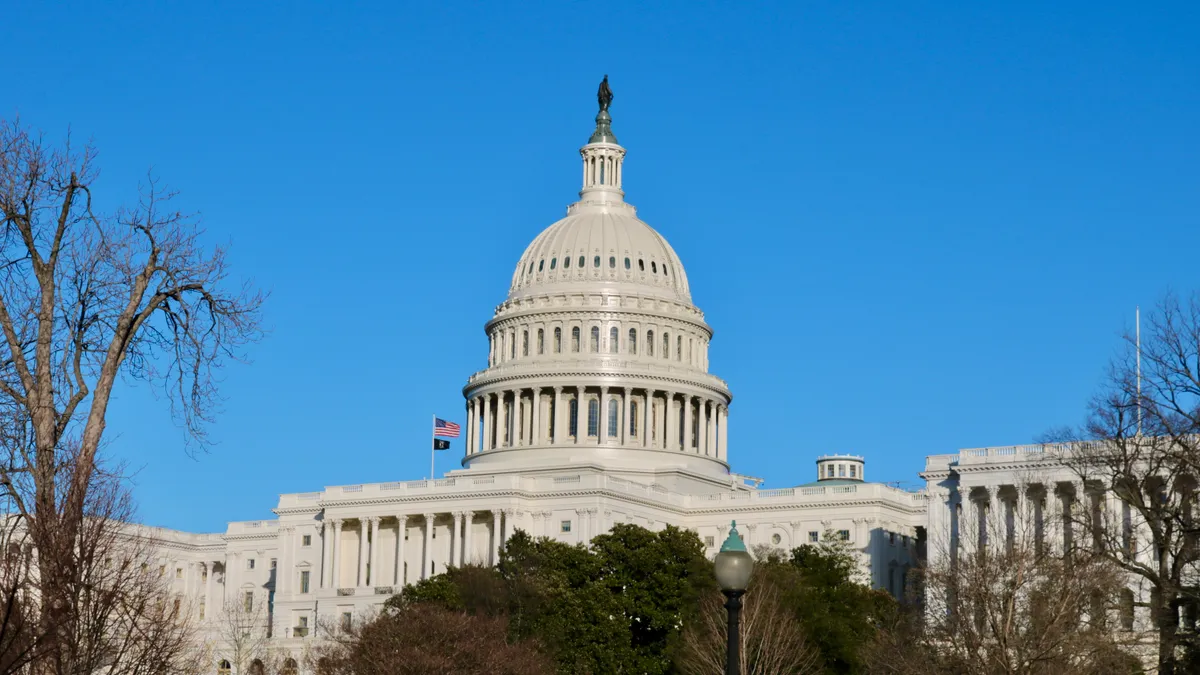Dive Brief:
- Dozens of Republican lawmakers in the Senate and House of Representatives panned a Securities and Exchange Commission (SEC) proposal that companies report on climate risk, saying the rule would overstep SEC authority, impose “enormous costs” on employers and discourage companies from going public.
- “Not only would this proposal add additional red tape and bureaucracy that would be extremely burdensome, if not impossible, for many companies to fully comply with, but it would also far exceed the authority that Congress explicitly granted the SEC,” 40 Republican House members said in an April 11 letter to the SEC. “This information would only be used to smear these companies.”
- The SEC, lacking the technical expertise critical for vetting companies’ climate models and assumptions used in any disclosures, may impose arbitrary, uneven or unfair reviews, 19 Republican senators said in an April 5 letter calling on SEC Chair Gary Gensler to withdraw the proposal.
Dive Insight:
Gensler last month released an SEC proposal that companies follow detailed rules for reporting on climate risk, asserting that businesses and investors will benefit from clear, uniform disclosures on the costs from global warming.
The rules “would provide investors with consistent, comparable and decision-useful information for their investment decisions and would provide consistent and clear reporting obligations for issuers,” Gensler said Tuesday. Investors with $130 trillion in assets under management have asked companies to disclose their climate risks, he said.
Under the proposal, the SEC would require companies to describe on Form 10-K their governance and strategy toward climate risk and their plan to achieve any targets they’ve set for curbing such risk. Companies would need to disclose their greenhouse gas emissions, either from their facilities or through their energy purchases, and obtain independent attestation of their data and estimates.
The SEC would also require some companies to report on so-called Scope 3 emissions by their suppliers, vendors and other third parties across their supply chains. The reports would be phased in, subject to safe harbor protections and not required of smaller companies. The initiative is subject to a comment period scheduled to end May 20.
The proposal springs from the principles underlying the SEC’s “long tradition of disclosures” dating to the 1930s, Gensler said in a webcast sponsored by Ceres, a non-profit advocate for sustainability. “Investors get to decide which risks to take, as long as public companies provide full and fair disclosure and are truthful in those disclosures.”
Republicans in the House disagreed, saying the proposal would dispatch regulators on behalf of non-investor stakeholders to tell business leaders how to run their companies.
“This proposal would drastically disrupt the current disclosure regime,” the House Republicans said. “The SEC’s actions would act to undermine and shame public companies, not to provide investors with necessary financial disclosures.”
The SEC is reaching far beyond its congressionally mandated powers, the Republican senators said.
“The proposed rule is not within the SEC’s mission to protect investors, maintain fair, orderly and efficient markets and facilitate capital formation,” said the senators, including Patrick Toomey of Pennsylvania, the ranking Republican on the banking committee that oversees the SEC.
“This proposal comes with enormous costs for employers,” the senators said. “Public companies would face billions in new compliance costs to meet the new requirements.”
Yet companies will ultimately benefit from climate-risk disclosure, Anne Simpson, global head of sustainability at Franklin Templeton, said during the webcast.
“One, it’s going to save them money” by standardizing guidelines and simplifying reporting, Simpson said.
“Secondly, it’s going to give them clarity on what to focus on, and thirdly, the evidence shows it’s going to improve their cost of capital,” she said. “Companies that are doing a better job on the reporting side on sustainability are winning a lower cost of capital.”














